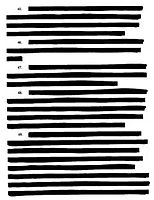Censor bars
Appearance
Censor bars are a basic form of text, photography, and video censorship in which "sensitive" information or images are occluded by black, gray, or white rectangular boxes. These bars have been used to censor various parts of images.[1][2] Since the creation of digital editing software which can apply less obtrusive effects such as pixelization and blurring, censor bars are typically used for satire,[3][4] although they remain in contemporary use to address privacy concerns. Censor bars are also used in art forms such as blackout poetry.
Censor bars may also have the words 'censored', 'redacted', 'private information', 'sensitive information', etc. to indicate their presence.
Illustrations of usage
-
A 1965 Federal Bureau of Investigation surveillance photograph
-
A heavily redacted page from the lawsuit American Civil Liberties Union v. Ashcroft
-
The censor bar as used by Google in the SOPA and PIPA online protests
-
Censor bars applied to a model
-
Censor bars applied to a patient with Stevens–Johnson syndrome
-
Censor bars used to anonymise a woman with familial dysautonomia
-
The Turkish Wikipedia logo with a censor bar covering the text, used from April 2017 to January 2020 when Turkish authorities blocked online access to Wikipedia in all languages across Turkey
-
A portion of the redacted affidavit used to obtain a search warrant for former U.S. President Donald Trump’s Mar-a-Lago home and resort, with the signature block blacked out.
See also
References
- ^ The Purple Decades: A Reader, Tom Wolfe, p. 78
- ^ Context Providers: Conditions of Meaning in Media Arts, Margot Lovejoy & Christiane Paul & Victoria Vesna [1]
- ^ Banned in the media: a reference guide to censorship in the press, motion pictures, broadcasting, and the internet, Herbert N. Foerstel, p. 208 [2]
- ^ Click: The Forces Behind How We Fully Engage with People, Work, and Everything We Do, Ori Brafman & Rom Brafman, p.108 [3]
External links
Wikimedia Commons has media related to Censor bars.









